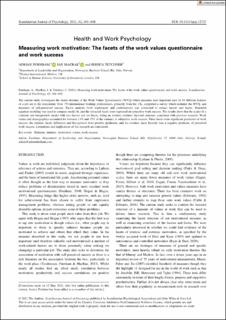Measuring work motivation: The facets of the work values questionnaire and work success
Peer reviewed, Journal article
Published version
Permanent lenke
https://hdl.handle.net/11250/3044251Utgivelsesdato
2021Metadata
Vis full innførselSamlinger
- Scientific articles [2181]
Sammendrag
The current study investigates the factor structure of the Work Values Questionnaire (WVQ) which measures how important each of 44 different features of a job are to the respondent. Over 750 international working professionals, primarily from the UK, completed a survey which included the WVQ, and measures of self-perceived success. Factor analysis (both exploratory and confirmatory) was conducted to extract factors and facets. Structural equation modeling was used to compare model fit, and the extracted facets were regressed on subjective work success. The results show that the scales fit a coherent and interpretable model with two factors and six facets, fitting an intrinsic–extrinsic factorial structure, consistent with previous research. Work values and demographics accounted for between 13% and 17% of the variance in subjective work success. Three facets were significant predictors of work success: the intrinsic facets Affiliation and Recognition were positive predictors, and the extrinsic facet Security was a negative predictor, of perceived work success. Limitations and implications of this research are considered.

